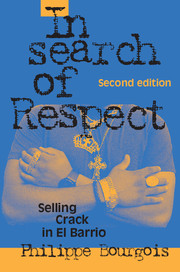Book contents
- Frontmatter
- Contents
- Acknowledgments
- Preface to the 2003 Second Edition
- Introduction
- 1 Violating Apartheid in the United States
- 2 A Street History of El Barrio
- 3 Crackhouse Management: Addiction, Discipline, and Dignity
- 4 “Goin Legit”: Disrespect and Resistance at Work
- 5 School Days: Learning to be a Better Criminal
- 6 Redrawing the Gender Line on the Street
- 7 Families and Children in Pain
- 8 Vulnerable Fathers
- 9 Conclusion
- Epilogue
- Epilogue 2003
- Notes
- Bibliography
- Index
- Other books in the series
Preface to the 2003 Second Edition
Published online by Cambridge University Press: 05 June 2014
- Frontmatter
- Contents
- Acknowledgments
- Preface to the 2003 Second Edition
- Introduction
- 1 Violating Apartheid in the United States
- 2 A Street History of El Barrio
- 3 Crackhouse Management: Addiction, Discipline, and Dignity
- 4 “Goin Legit”: Disrespect and Resistance at Work
- 5 School Days: Learning to be a Better Criminal
- 6 Redrawing the Gender Line on the Street
- 7 Families and Children in Pain
- 8 Vulnerable Fathers
- 9 Conclusion
- Epilogue
- Epilogue 2003
- Notes
- Bibliography
- Index
- Other books in the series
Summary
In the seven years since the first edition of this book went to press in the fall of 1995, four major dynamics altered the tenor of daily life on the streets of East Harlem and deeply affected the lives of the crack dealers and their families depicted in these pages: 1) The U.S. economy entered the most prolonged period of sustained growth in its recorded history; 2) the size of the Mexican immigrant population in New York City and especially in East Harlem increased dramatically; 3) the war on drugs escalated into a quasi-official public policy of criminalizing and incarcerating the poor and the socially marginal; and 4) drug fashion trends among inner-city youth rendered marijuana even more popular and crack and heroin even less popular among Latinos and African Americans.
In 2002, crack, cocaine, and heroin were still sold on the block where I lived, but they were sold less visibly by a smaller number of people. It was still easy to purchase narcotics throughout East Harlem, but much of the drug dealing had moved indoors, out of sight of the police. There were fewer small-time hawkers competing openly on street corners, shouting out the brand names of their drugs. Most importantly, heroin and crack continued to be spurned by Latino and African American youth who had witnessed as children the ravages that those drugs committed on the older generations in their community.
- Type
- Chapter
- Information
- In Search of RespectSelling Crack in El Barrio, pp. xvii - xxivPublisher: Cambridge University PressPrint publication year: 2002
- 1
- Cited by

